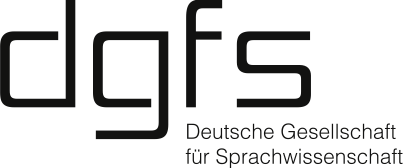AG 9: Varieties of positive polarity items
AG-Koordination
Mingya Liu (U Osnabrück) & Gianina Iordăchioaia (U Stuttgart)
Abstract
In the past, the rich literature on polarity sensitivity mostly focused on negative polarity items (NPIs); positive polarity items (PPIs) were believed to be less impressive in number, productivity, and strength (Horn 1989:157). Recent literature, however, shows that PPIs are empirically just as robust as NPIs and raise theoretically intriguing questions at the interfaces between syntax, semantics and pragmatics. In this workshop, we seek to bring to discussion questions about:
- language-specific and cross-linguistic varieties of PPIs and
- their formal modeling in different theoretical frameworks.
Positive polarity is known to be highly language-dependent. Speaker-oriented adverbs such as unfortunately/leider act as PPIs in English and German, but their Czech correspondents do not (Junghanns 2006). Similarly, Zeijlstra (2013) argues that, unlike in English, the universal quantifier iedereen ‘everybody’ in Dutch is a PPI. This diversity challenges the plausibility of a unified account of positive polarity. One of the main theoretical debates in this respect concerns the nature of PPIs in relation to the better-studied NPIs. In Szabolcsi (2004), for instance, anti-additivity is as important for PPIs as downward entailment for NPIs. Another concern is the relevance of notions such as scalarity and scope to the modeling of PPIs within and across individual languages. Nilsen (2004) and Sawada (2011) analyze PPI modal adverbs like probably and Japanese minimizer PPIs like chotto/sukoshi ‘a bit’ by means of scales, but others propose alternate non-scalar approaches (e.g., Ernst 2009, Giannakidou 2011, Liu 2012, Iatridou & Zeijlstra 2013, Homer t.a.). While most PPIs can outscope negation, a promising research question relates to PPIs that ban negation altogether (see German *schon nicht / *nicht schon, Löbner 1999) and their modeling by comparison to inversely licensed NPIs (see Korean amwu-to ‘anyone’ in Sells & Kim 2006).
Our workshop will provide the ideal platform for such empirical and theoretical discussions, but also for experimental (see Saddy et al. 2004), diachronic and computational studies towards a better understanding of polarity in natural language.
Programm
| 4.3.2015 | |||
| 14:00 | Osamu Sawada (Mie U) | ||
| Varieties of positive polarity minimizers in Japanese | |||
| 15:00 | Makoto Kaneko (Okayama U) | ||
| Diversity of the source of positive polarity – with special reference to Japanese WH-ka | |||
| 15:30 | Chungmin Lee (Seoul National U) | ||
| Wh-indefinites as PPIs and wh-indefinites plus –to ‘even’ as NPIs: In Korean and other languages | |||
| 16:00 | Pause | ||
| 16:30 | Anamaria Fălăuş (CNRS, Laboratoire de Linguistique de Nantes) | ||
| Positive polarity indefinites? On how (not) to identify them | |||
| 17:30 | Andreea Nicolae (ZAS Berlin) | ||
| The positive polarity aspect of weak disjunction | |||
| 18:00 | Sumiyo Nishiguchi (Tokyo U of Science) | ||
| Bipolar items and positive polarity | |||
| 5.3.2015 | |||
| 9:00 | Vincent Homer (CNRS, UMASS Amherst) | ||
| Wide-scope taking PPIs | |||
| 10:00 | Hedde Zeijlstra (U Göttingen) | ||
| Self-anti-licensers: the case of universal quantifier PPIs | |||
| 10:30 | Manfred Sailer (Goethe U Frankfurt) | ||
| Doing the devil: an unrescuable PPI | |||
| 11:00 | Pause | ||
| 11:30 | Olga Kellert (U Göttingen) | ||
| Positive polarity items under clause-mate negation | |||
| 12:00 | Elena-Castroviejo & Berit Gehrke (ILLA, CCHS-CSIC & CNRS / Paris Diderot) | ||
| On extreme degree and positive polarity | |||
| 12:30 | Mingya Liu (U Osnabrück) | ||
| Positive polarity of conventional implicatures | |||
| 6.3.2015 | |||
| 11:30 | Jack Hoeksema (U Groningen) | ||
| Positive polarity predicates | |||
| 12:30 | Pierre-Yves Modicom (U Paris Sorbonne) | ||
| Discourse particles as PPIs? Elements from English, German and French | |||
| 13:00 | Final discussion |
Abweichung vom ursprünglichen Plan
Der Vortrag von Zamfirescu ist entfallen.

